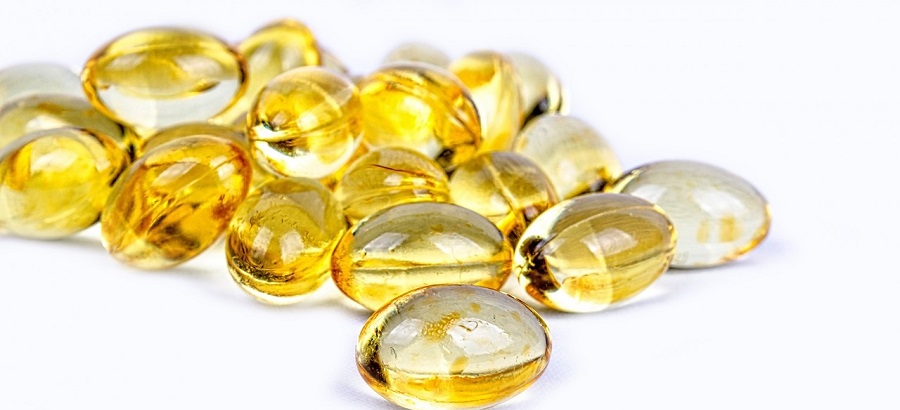There are multiple types of vitamins, which is why people often get confused. In this article, we will explain how vitamins can be categorized.
All types of Vitamins
Fat-soluble vitamins and water-soluble vitamins are two categories of essential nutrients that our bodies require in small amounts for normal functioning. The key difference between them lies in their solubility, or ability to dissolve, in different substances.
Fat-Soluble Vitamins:
- Fat-soluble vitamins are soluble in dietary fats and oils but insoluble in water.
- They are absorbed along with dietary fats in the small intestine and are transported through the bloodstream by specialized carrier proteins.
- Fat-soluble vitamins can be stored in the body's fatty tissues and the liver for later use.
- Because they are stored in the body, excess intake of fat-soluble vitamins can potentially lead to toxicity.
The four primary fat-soluble vitamins are:
- Vitamin A: Important for vision, immune function, and cell growth.
- Vitamin D: Essential for calcium absorption, bone health, and immune function.
- Vitamin E: Functions as an antioxidant, protecting cells from damage.
- Vitamin K: Necessary for blood clotting and bone health.
Water-Soluble Vitamins:
| Fat-Soluble Vitamins | Water-Soluble Vitamins |
|---|---|
| Absorption and Storage | Absorbed with dietary fat and stored in body tissues, including liver and fatty tissues. |
| Solubility | Insoluble in water |
| Transport in the Body | Require transport proteins for circulation in the bloodstream. |
| Excretion | Eliminated slowly from the body. |
| Daily Intake Recommendations | Fat-soluble vitamins are required in smaller amounts compared to water-soluble vitamins. |
| Sources | Found in fatty foods, such as oils, nuts, seeds, and animal products. |
| Examples | Vitamin A, Vitamin D, Vitamin E, Vitamin K |
- Water-soluble vitamins are soluble in water but insoluble in fats and oils.
- They are absorbed directly into the bloodstream from the small intestine and circulate freely throughout the body.
- Water-soluble vitamins are not stored in large amounts in the body and are typically excreted through urine, which means they need to be replenished regularly.
- Because they are not stored, excessive intake of water-soluble vitamins is generally excreted, reducing the risk of toxicity.
Examples of water-soluble vitamins include:
- Vitamin C: Important for immune function, collagen synthesis, and antioxidant activity.
- B-vitamins (e.g., B1, B2, B3, B5, B6, B7, B9, B12): Involved in various metabolic processes, energy production, nervous system function, and red blood cell formation.
Both fat-soluble and water-soluble vitamins play crucial roles in maintaining overall health and well-being. It is important to consume a balanced diet that includes foods rich in both types of vitamins to meet your body's nutritional requirements.
It's important to note that while both types of vitamins are essential for proper functioning of the body, the main difference lies in their solubility, absorption, storage, and excretion mechanisms.
Water-Soluble Vitamins
Water-soluble vitamins are those that dissolve in water and are not stored in the body. They are easily excreted through urine, which means that they need to be replenished regularly. Here are some of the most important water-soluble vitamins:
Vitamin B1 (Thiamine)
Vitamin B1, also known as thiamine, is essential for the proper functioning of the nervous system and the metabolism of carbohydrates. It is found in foods such as whole grains, legumes, and nuts.
Vitamin B2 (Riboflavin)
Vitamin B2, also known as riboflavin, is important for the metabolism of fats, carbohydrates, and proteins. It is found in foods such as milk, eggs, and leafy green vegetables.
Vitamin B3 (Niacin)
Vitamin B3, also known as niacin, is important for the metabolism of carbohydrates and fats, as well as for the proper functioning of the nervous system. It is found in foods such as meat, fish, and whole grains.
Vitamin B5 (Pantothenic Acid)
Vitamin B5, also known as pantothenic acid, is important for the metabolism of carbohydrates, fats, and proteins. It is found in foods such as meat, fish, and whole grains.
Vitamin B6 (Pyridoxine)
Vitamin B6, also known as pyridoxine, is important for the metabolism of proteins and the production of red blood cells. It is found in foods such as meat, fish, and whole grains.
Vitamin B7 (Biotin)
Vitamin B7, also known as biotin, is important for the metabolism of carbohydrates, fats, and proteins. It is found in foods such as eggs, nuts, and whole grains.
Vitamin B9 (Folate)
Vitamin B9, also known as folate, is important for the production of red blood cells and the proper development of the fetal nervous system. It is found in foods such as leafy green vegetables, legumes, and citrus fruits.
Vitamin B12 (Cobalamin)
Vitamin B12, also known as cobalamin, is important for the production of red blood cells and the proper functioning of the nervous system. It is found in foods such as meat, fish, and dairy products.
Fat-Soluble Vitamins
Fat-soluble vitamins are those that dissolve in fat and are stored in the body. They are not easily excreted, which means that they can accumulate in the body and cause toxicity if taken in excess. Here are some of the most important fat-soluble vitamins:
Vitamin A
Vitamin A is important for the proper functioning of the immune system, the maintenance of healthy skin and vision, and the growth and development of bones. It is found in foods such as liver, fish, and dairy products.
Vitamin D
Vitamin D is important for the absorption of calcium and phosphorus, the maintenance of healthy bones, and the proper functioning of the immune system. It is found in foods such as fatty fish and fortified dairy products, but it can also be synthesized by the body through exposure to sunlight.

Fat solable - source: pexels.com
Vitamin E
Vitamin E is important for the protection of cell membranes from damage caused by free radicals, which can contribute to the development of chronic diseases. It is found in foods such as nuts, seeds, and vegetable oils.
Vitamin K
Vitamin K is important for the proper clotting of blood and the maintenance of healthy bones. It is found in foods such as leafy green vegetables, liver, and egg yolks.In conclusion, vitamins are essential nutrients that the body needs to function properly. They can be divided into two main categories: water-soluble vitamins, which are not stored in the body and need to be replenished regularly, and fat-soluble vitamins, which are stored in the body and can cause toxicity if taken in excess. By eating a balanced diet that includes a variety of foods, you can ensure that you are getting all the vitamins your body needs to stay healthy.
Types of Supplements
Supplements are a popular addition to many people's diets, especially for those who are looking to improve their fitness and overall health. There are many different types of supplements available on the market, each with their own unique benefits. In this article, we will explore some of the most common types of supplements and their benefits.
Protein Supplements
| Type of Protein Supplement | Description |
|---|---|
| Whey Protein | Derived from milk during the cheese-making process. It is quickly absorbed and rich in amino acids, making it popular for muscle recovery and growth. |
| Casein Protein | Also derived from milk, but it is absorbed more slowly than whey protein. It provides a sustained release of amino acids, making it suitable for prolonged muscle support, such as overnight or between meals. |
| Soy Protein | Made from soybeans, it is a plant-based protein source suitable for vegetarians and vegans. Soy protein contains all essential amino acids and is known for its potential health benefits. |
| Pea Protein | Extracted from yellow peas, it is another popular plant-based protein option. Pea protein is easily digestible, hypoallergenic, and suitable for individuals with dietary restrictions. |
| Rice Protein | Derived from brown rice, it is a hypoallergenic and easily digestible plant-based protein. Rice protein is often combined with other plant proteins to provide a complete amino acid profile. |
| Hemp Protein | Made from hemp seeds, it is a plant-based protein source rich in omega-3 fatty acids and fiber. Hemp protein is suitable for individuals following a vegan or vegetarian diet. |
| Collagen Protein | Derived from animal sources, such as bones and skin, collagen protein is rich in amino acids that support joint health, skin elasticity, and hair and nail growth. It is often used for its beauty and joint-supporting properties. |
| Egg Protein | Made from egg whites, it is a high-quality protein source that contains all essential amino acids. Egg protein is lactose-free and suitable for individuals with dairy allergies or intolerances. |
| Mixed Plant Protein | Blends of different plant proteins, such as a combination of pea, rice, and hemp protein, to provide a complete amino acid profile and maximize nutritional benefits. |
Protein supplements are one of the most popular types of supplements on the market. They are often used by athletes and bodybuilders to help build and repair muscle tissue. There are several different types of protein supplements available, including whey protein, casein protein, and soy protein.
Whey Protein
Whey protein is one of the most popular types of protein supplements. It is a fast-digesting protein that is quickly absorbed by the body. Whey protein is often used as a post-workout supplement to help repair and rebuild muscle tissue. It is also a good source of essential amino acids, which are important for muscle growth and repair.
Casein Protein
Casein protein is a slow-digesting protein that is often used as a bedtime snack. It is slowly absorbed by the body, which makes it a good choice for people who want to maintain a steady supply of protein throughout the night. Casein protein is also a good source of essential amino acids, which are important for muscle growth and repair.
Soy Protein
Soy protein is a plant-based protein that is often used by vegetarians and vegans. It is a good source of essential amino acids and is often used as a substitute for animal-based protein sources. Soy protein is also a good source of antioxidants, which can help protect the body from damage caused by free radicals.
Pre-Workout Supplements
| Type of Pre-Workout Supplement | Description |
|---|---|
| Caffeine | A stimulant that increases alertness and reduces fatigue. Caffeine can enhance focus and energy levels, leading to improved performance during workouts. |
| Beta-Alanine | An amino acid that helps increase muscle endurance by buffering acid build-up in muscles, delaying fatigue, and improving overall workout capacity. |
| Creatine | A compound that provides energy for muscle contractions and enhances strength and power. Creatine supplementation can improve performance during high-intensity exercises. |
| Citrulline | An amino acid that increases blood flow and enhances nitric oxide production, promoting better nutrient delivery to muscles and improving endurance and performance. |
| BCAAs (Branched-Chain Amino Acids) | Essential amino acids (leucine, isoleucine, and valine) that play a role in protein synthesis, reducing muscle damage, and promoting recovery. They are often consumed during workouts to prevent muscle breakdown. |
| Nitric Oxide Boosters | Supplements that increase nitric oxide levels in the body, leading to improved blood flow, vasodilation, and enhanced muscle pump during workouts. |
| L-Arginine | An amino acid that serves as a precursor to nitric oxide production, promoting increased blood flow and vasodilation. It is often used as a nitric oxide booster. |
| Pre-Workout Blends | Combination products that contain various ingredients, such as caffeine, amino acids, vitamins, and minerals, formulated to provide a comprehensive pre-workout boost for energy, focus, endurance, and performance. |
Pre-workout supplements are designed to help increase energy, focus, and endurance during workouts. They often contain a combination of ingredients, including caffeine, creatine, and beta-alanine.
Caffeine
Caffeine is a stimulant that is often used to help increase energy and focus. It is commonly found in coffee, tea, and energy drinks. Caffeine can help improve athletic performance by reducing fatigue and increasing endurance.
Creatine
Creatine is a naturally occurring compound that is found in muscle tissue. It is often used as a supplement to help increase muscle mass and strength. Creatine can also help improve athletic performance by increasing energy and reducing fatigue.
Beta-Alanine
Beta-alanine is an amino acid that is often used as a supplement to help increase endurance and reduce fatigue. It works by increasing the levels of carnosine in the muscles, which can help improve athletic performance.
Post-Workout Supplements
| Type of Post-Workout Supplement | Description |
|---|---|
| Protein Powder | Protein powders, such as whey protein, casein protein, or plant-based protein, are commonly used post-workout to support muscle recovery and repair. They provide essential amino acids for muscle protein synthesis. |
| BCAAs (Branched-Chain Amino Acids) | BCAA supplements are often consumed post-workout to promote muscle recovery and reduce muscle soreness. They help in replenishing amino acids and supporting protein synthesis. |
| Creatine | Creatine supplements are not limited to pre-workout use. Post-workout creatine supplementation can also be beneficial for replenishing creatine stores and promoting muscle recovery and growth. |
| Glutamine | Glutamine is an amino acid that supports muscle recovery and immune function. It can help reduce muscle soreness and aid in muscle repair after intense workouts. |
| Carbohydrate Supplements | Consuming carbohydrates post-workout helps replenish glycogen stores in the muscles, providing energy and promoting recovery. Carbohydrate supplements like dextrose or maltodextrin are commonly used for this purpose. |
| Electrolyte Replenishers | Electrolyte supplements, including sodium, potassium, magnesium, and others, help restore electrolyte balance lost through sweat during exercise. They aid in rehydration and muscle function. |
| Antioxidants | Antioxidant supplements, such as vitamins C and E, or natural antioxidants like green tea extract or tart cherry juice, can help reduce exercise-induced oxidative stress and support recovery. |
| Omega-3 Fatty Acids | Omega-3 fatty acids, typically obtained from fish oil supplements, provide anti-inflammatory benefits and support joint health. They may aid in reducing exercise-induced inflammation and promoting recovery. |
| Post-Workout Blends | Combination products that contain a mix of post-workout ingredients like protein, carbohydrates, BCAAs, and other supportive compounds, designed to provide a comprehensive recovery and replenishment formula after exercise. |
Post-workout supplements are designed to help the body recover after a workout. They often contain a combination of ingredients, including BCAAs, glutamine, and whey protein.
BCAAs
BCAAs, or branched-chain amino acids, are a group of essential amino acids that are often used as a supplement to help improve muscle recovery and reduce muscle soreness. They can also help increase muscle growth and improve athletic performance.
Glutamine
Glutamine is an amino acid that is often used as a supplement to help improve muscle recovery and reduce muscle soreness. It can also help improve immune function and reduce inflammation in the body.
Whey Protein
Whey protein is often used as a post-workout supplement to help repair and rebuild muscle tissue. It is a fast-digesting protein that is quickly absorbed by the body, making it an ideal choice for post-workout recovery.In conclusion, supplements can be a useful addition to a healthy diet and exercise routine. However, it is important to remember that supplements should not be used as a substitute for a healthy diet and lifestyle. It is also important to consult with a healthcare professional before starting any new supplement regimen.
Benefits of Vitamins and Supplements
Improved Immune System
Our immune system is responsible for protecting our body from harmful pathogens and diseases. Vitamins and supplements can play a crucial role in boosting our immune system. Vitamin C, for example, is known for its immune-boosting properties. It helps in the production of white blood cells, which are responsible for fighting off infections. Vitamin D is also essential for a healthy immune system. It helps in the production of antimicrobial peptides that fight off harmful pathogens.
Increased Energy Levels
Many people struggle with low energy levels, which can affect their productivity and overall quality of life. Vitamins and supplements can help in boosting energy levels. B vitamins, for example, are essential for converting food into energy. They also help in the production of red blood cells, which carry oxygen to the body's tissues. Iron is another essential nutrient that helps in the production of red blood cells and can help in reducing fatigue.
Improved Athletic Performance
Athletes and fitness enthusiasts can benefit greatly from taking vitamins and supplements. Creatine, for example, is a popular supplement that can help in improving athletic performance. It helps in the production of ATP, which is the primary source of energy for our muscles. Beta-alanine is another supplement that can help in reducing fatigue and improving endurance.
Reduced Risk of Chronic Diseases
Chronic diseases such as heart disease, diabetes, and cancer are a significant health concern worldwide. Vitamins and supplements can help in reducing the risk of these diseases. Omega-3 fatty acids, for example, are known for their anti-inflammatory properties and can help in reducing the risk of heart disease. Vitamin D can also help in reducing the risk of certain types of cancer.In conclusion, vitamins and supplements can play a crucial role in maintaining good health and preventing diseases. However, it is essential to consult with a healthcare professional before taking any supplements, as they can interact with medications and have side effects. A balanced diet and regular exercise are also essential for maintaining good health.
Risks and Side Effects of Vitamins and Supplements

Vitamin overdose - source: pexels.com
Overdose
Taking too much of a vitamin or supplement can lead to an overdose, which can cause serious health problems. Some vitamins, such as vitamin A and vitamin D, can be toxic in high doses. Symptoms of an overdose can include nausea, vomiting, diarrhea, headaches, and dizziness. In severe cases, an overdose can lead to organ damage or even death.It's important to follow the recommended dosage on the label of any vitamin or supplement you take. If you're unsure about how much to take, talk to your doctor or a registered dietitian.
Interactions with Medications
Some vitamins and supplements can interact with medications, which can lead to serious health problems. For example, taking vitamin K supplements while taking blood thinners can increase the risk of bleeding. St. John's wort, a popular herbal supplement, can interact with antidepressants and other medications, making them less effective.It's important to tell your doctor about any vitamins or supplements you're taking, especially if you're taking prescription medications. Your doctor can help you determine if there are any potential interactions and adjust your medication or supplement regimen accordingly.
Unsafe Ingredients
Not all vitamins and supplements are created equal. Some products may contain unsafe ingredients, such as heavy metals or harmful chemicals. In some cases, the ingredients listed on the label may not match what's actually in the product.To ensure that you're taking a safe and effective vitamin or supplement, look for products that have been independently tested by a third-party organization, such as the United States Pharmacopeia (USP) or ConsumerLab.com. These organizations test products for purity, potency, and quality, and provide a seal of approval for products that meet their standards.In conclusion, while vitamins and supplements can be beneficial for overall health and wellness, it's important to be aware of the potential risks and side effects. By following the recommended dosage, talking to your doctor about potential interactions, and choosing products that have been independently tested, you can ensure that you're taking a safe and effective supplement.


